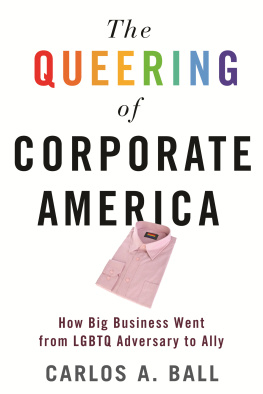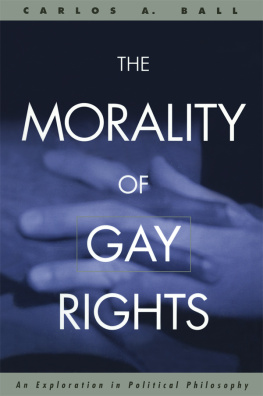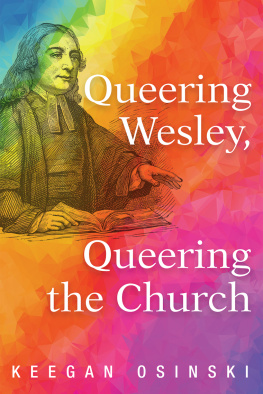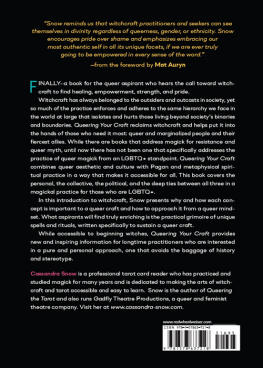Carlos A. Ball - The Queering of Corporate America: How Big Business Went from LGBTQ Adversary to Ally
Here you can read online Carlos A. Ball - The Queering of Corporate America: How Big Business Went from LGBTQ Adversary to Ally full text of the book (entire story) in english for free. Download pdf and epub, get meaning, cover and reviews about this ebook. year: 2019, genre: Politics. Description of the work, (preface) as well as reviews are available. Best literature library LitArk.com created for fans of good reading and offers a wide selection of genres:
Romance novel
Science fiction
Adventure
Detective
Science
History
Home and family
Prose
Art
Politics
Computer
Non-fiction
Religion
Business
Children
Humor
Choose a favorite category and find really read worthwhile books. Enjoy immersion in the world of imagination, feel the emotions of the characters or learn something new for yourself, make an fascinating discovery.
- Book:The Queering of Corporate America: How Big Business Went from LGBTQ Adversary to Ally
- Author:
- Genre:
- Year:2019
- Rating:3 / 5
- Favourites:Add to favourites
- Your mark:
- 60
- 1
- 2
- 3
- 4
- 5
The Queering of Corporate America: How Big Business Went from LGBTQ Adversary to Ally: summary, description and annotation
We offer to read an annotation, description, summary or preface (depends on what the author of the book "The Queering of Corporate America: How Big Business Went from LGBTQ Adversary to Ally" wrote himself). If you haven't found the necessary information about the book — write in the comments, we will try to find it.
Carlos A. Ball: author's other books
Who wrote The Queering of Corporate America: How Big Business Went from LGBTQ Adversary to Ally? Find out the surname, the name of the author of the book and a list of all author's works by series.
The Queering of Corporate America: How Big Business Went from LGBTQ Adversary to Ally — read online for free the complete book (whole text) full work
Below is the text of the book, divided by pages. System saving the place of the last page read, allows you to conveniently read the book "The Queering of Corporate America: How Big Business Went from LGBTQ Adversary to Ally" online for free, without having to search again every time where you left off. Put a bookmark, and you can go to the page where you finished reading at any time.
Font size:
Interval:
Bookmark:

ALSO BY CARLOS A . BALL
The First Amendment and LGBT Equality: A Contentious History
After Marriage Equality: The Future of LGBT Rights (editor)
Same-Sex Marriage and Children: A Tale of History, Social Science, and Law
The Right to Be Parents: LGBT Families and the Transformation of Parenthood
From the Closet to the Courtroom: Five LGBT Rights Lawsuits That Have Changed Our Nation
The Morality of Gay Rights: An Exploration in Political Philosophy
Cases and Materials on Sexuality, Gender Identity, and the Law (coeditor)
QUEER ACTION/QUEER IDEAS
a unique series addressing pivotal issues within the LGBTQ movement
BOOKS IN THE QUEER ACTION SERIES
Family Pride: What LGBT Families Should Know about Navigating Home, School, and Safety in Their Neighborhoods, by Michael Shelton
Out Law: What LGBT Youth Should Know About Their Legal Rights, by Lisa Keen
Come Out and Win: Organizing Yourself, Your Community, and Your World, by Sue Hyde
BOOKS IN THE QUEER IDEAS SERIES
Loves Promises: How Formal and Informal Contracts Shape All Kinds of Families, by Martha M. Ertman
Gaga Feminism: Sex, Gender, and the End of Normal, by J. Jack Halberstam
God vs. Gay? The Religious Case for Equality, by Jay Michaelson
Queer (In)Justice: The Criminalization of LGBT People in the United States, by Joey L. Mogul, Andrea J. Ritchie, and Kay Whitlock
Beyond (Straight and Gay) Marriage: Valuing All Families Under the Law, by Nancy D. Polikoff
From the Closet to the Courtroom: Five LGBT Rights Lawsuits That Have Changed Our Nation, by Carlos A. Ball
At the Broken Places: A Mother and Trans Son Pick Up the Pieces, by Mary Collins and Donald Collins

For my children, Sebastian and Ema
IN APRIL OF 2019 President Donald Trumps White House ban on transgender troopsenforced against the advice of the Pentagon and many major military personnelwent into effect, reversing gains for the LGBTQ community that had advanced under Barack Obamas administration. Among the voices of protest was that of Erin Uritus, the CEO of Out & Equal: Workplace Advocates, a nonprofit that deals with LGBTQ workplace equality, who offered the following comment:
President Trump likes to portray himself as a successful business man. But on this issue, he is completely at odds with American businesses. Corporate America has figured out that standing up for trans rights is not just the right thing to do, it is also good business. Thats why a strong majority of the Fortune 500 companies offer protections based on gender identity and trans-inclusive healthcare options. The Trump Administration is trying to take America backwards. The good news is that Main Street wont let him succeed.
If you were to ask anyone involved in the gay liberation movement or early LGBTQ rights movement of the early 1970s if the words corporate America would ever be used positively in a statement on LGBTQ rights, they would be shocked and probably appalled. Capitalism, corporate entities, and many aspects of consumerism were understood to be antithetical to liberation. But many things can change over half a century.

The LGBTQ movement in the United States has developed in stages over seventy years. While always a continuous movement, each stage had different political aims and tactics from the previous incarnation. Early homophile groups in the 1950s, such as the Mattachine Society and Daughters of Bilitis, called for social justice based on combating injustice, legal reform, and promoting healthy and affirming sexual identities. In 1969, after the Stonewall riots, the gay liberation movement emerged and embraced radical stances including feminism and combating social inequality, racism, imperialism, and capitalism. A few years after this, an LGBTQ rights movement emerged that was less radical but more broad-based and focused on legal reform, acceptance, and social equality.
Carlos Balls The Queering of Corporate America finds its roots in each of these movements, although, for the most part, it is located in the contemporary LGBTQ rights movement of the last few decades. Balls breathtaking thesis is that as the LGBTQ rights movement demanded equality in the corporate worldfor political support, jobs, visibility, and basic human decencyit was capitalism, commerce, and advertising, that slowly morphed into entities that, in many ways, supported queer people and queer issues.
It is easy to label this as a case of strange bedfellows making politicscapitalism is usually not seen as a benefactor of progressive politicsbut Ball makes the intriguing and vital argument that this merging of the interests of LGBTQ rights and commercial interests was not only productive for all concerned but logical and inevitable.
Charting the fascinating history of how activists within and outside major corporations lobbied and fought for changes in hiring, benefits, and nondiscrimination, Ball makes the case thatas at certain other times in US historycorporations were understood to be able to work for the common good, and even social justice, and not just the bottom line.

Balls historyaside from being highly informative and entertainingis an important examination of an aspect of LGBTQ history that has been, until now, completely overlooked. The history of the struggle for LGBTQ rights in the United States has been one of surprises and contradictions. The Queering of Corporate America is one more example of how the power of queerness dovetailed with other social forces to make America a better place for everyone.
Michael Bronski
SERIES EDITOR
I N 1968, AN LGBTQ RIGHTS GROUP in San Francisco tried to place an ad in the Yellow Pages published by the Pacific Bell Telephone Company. The phone company refused to publish the ad, claiming that the firm had an obligation to protect its customers from a filthy phone book and that the word homosexual was offensive to good taste. A few years later, Pacific Bell, which was then the largest private employer in California, responded to complaints of discrimination by queer activists by issuing a statement explaining that we do not knowingly hire or retain in our employment personsand this would include homosexualswhose reputations, performance, or behavior would impose a risk to our customers, or employees, or to the reputation of the company.... We are not in a position to disregard commonly accepted standards of conduct, morality, or life-styles. The company later disclosed that it stamped a special code on applications of suspected gay, lesbian, and bisexual job candidates as a way of internally flagging individuals who should be rejected due to their sexual orientation.
Almost fifty years later, the Arkansas legislature approved a measure that would have made it easier for businesses and others to discriminate against LGBTQ people as long as they did so for religious reasons. That same day, the CEO of Walmart, the largest private employer in Arkansas (as well as in the country and the world), issued a statement demanding that the Republican governor veto the legislation. The CEO explained that the proposed law encouraged discrimination and was therefore inconsistent with our core basic belief of respect for the individual... and does not reflect the values we proudly uphold. Two days later, the conservative governor and state legislature, under intense pressure from Walmart and other large businesses, modified the law in ways that no longer condoned discrimination against sexual minorities and transgender individuals.
Font size:
Interval:
Bookmark:
Similar books «The Queering of Corporate America: How Big Business Went from LGBTQ Adversary to Ally»
Look at similar books to The Queering of Corporate America: How Big Business Went from LGBTQ Adversary to Ally. We have selected literature similar in name and meaning in the hope of providing readers with more options to find new, interesting, not yet read works.
Discussion, reviews of the book The Queering of Corporate America: How Big Business Went from LGBTQ Adversary to Ally and just readers' own opinions. Leave your comments, write what you think about the work, its meaning or the main characters. Specify what exactly you liked and what you didn't like, and why you think so.









